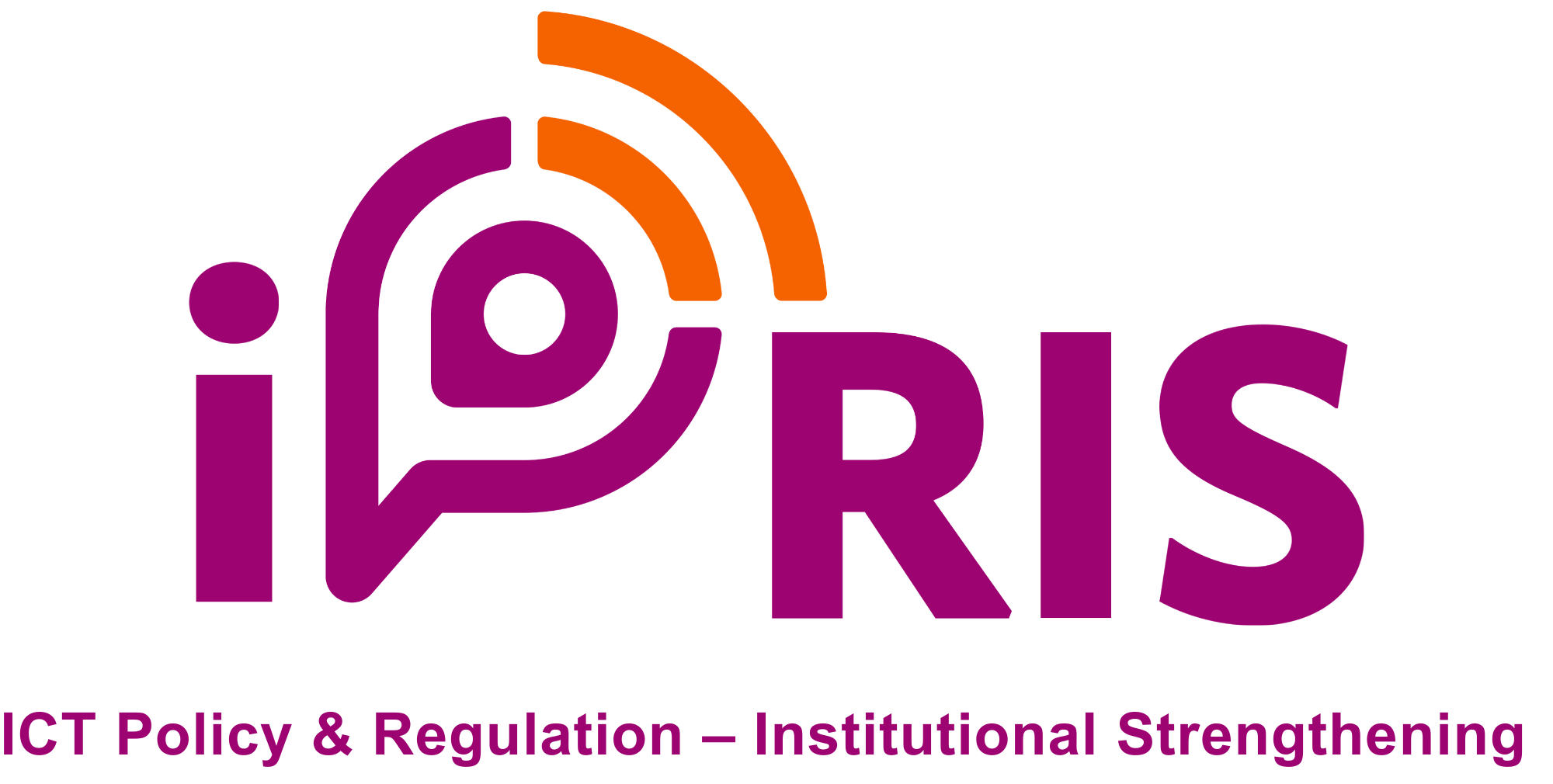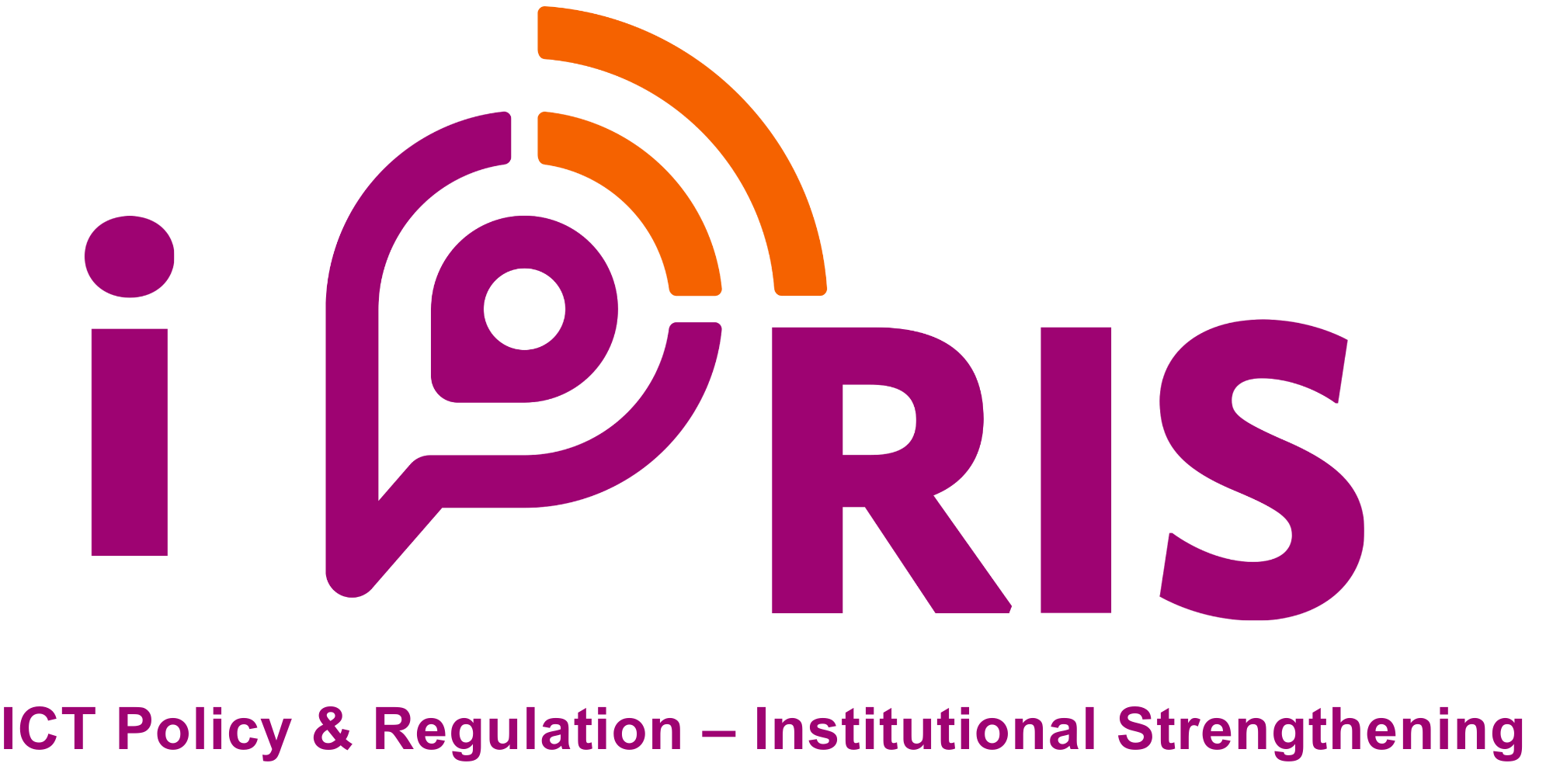The iPRIS project turns two this November! The seventh iPRIS cohort will mark a significant milestone in the peer-to-peer capacity-building programme targeting telecom regulators across 43 countries.
This cohort will meet in Stockholm, Sweden, from November 16 to December 3, 2025, for their first phase in the project. The delegates will include telecom regulators from Botswana, Ghana, Kenya, Lesotho, Malawi, The Gambia, and Sweden. They will also be joined by other African ICT experts from regional regulatory organisations (RROs): the East African Communications Organisation (EACO), the Communications Regulators’ Association of Southern Africa (CRASA), and the West Africa Telecommunications Regulators Assembly (WATRA), who will share lessons from regional cooperation frameworks. All these participants will collaborate and engage in meaningful discussions across the three weeks to improve institutional capacity, regulatory cooperation, and inclusive digital development.
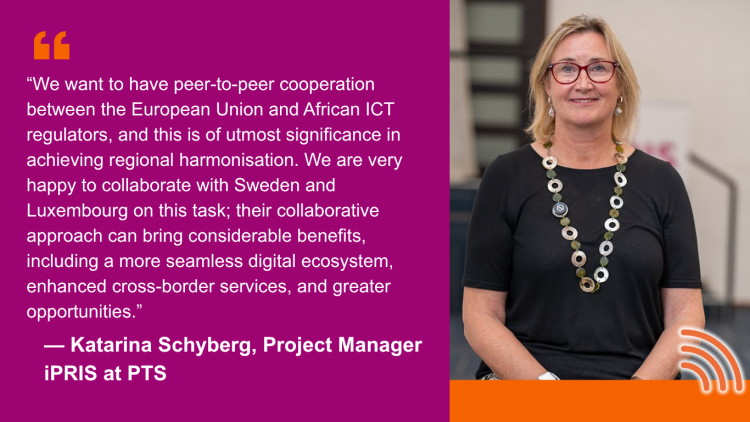
Two years of collaboration and growth
Since its inception in November 2023, the iPRIS programme has evolved into a dynamic platform for peer learning and regional cooperation. To date, it has supported over 120 telecom regulators across 31 African countries, advancing inclusive, evidence-based approaches to ICT policy and regulation.
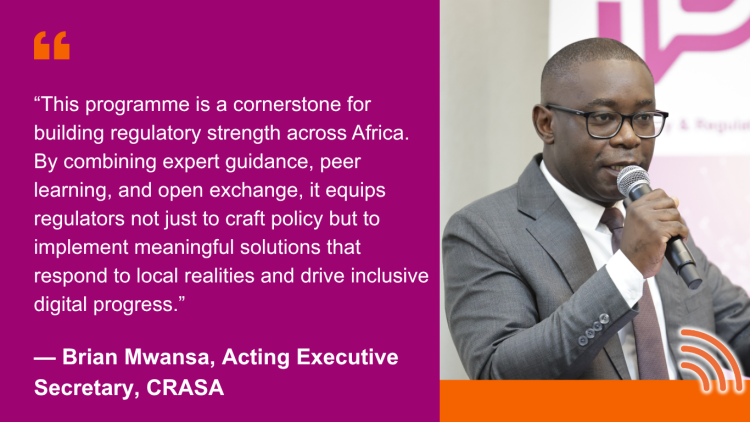
So far, iPRIS has engaged 31 NRAs across Sub-Saharan Africa, including:
Benin, Burundi, Cameroun, Central African Republic, Chad, Comoros, Congo-Brazzaville, Democratic Republic of the Congo, Eswatini, Gabon, The Gambia, Ghana, Kenya, Lesotho, Liberia, Malawi, Mauritania, Mauritius, Namibia, Nigeria, Rwanda, Senegal, Sierra Leone, South Africa, South Sudan, Tanzania, Togo, Uganda, Zambia, Zimbabwe, and Equatorial Guinea.
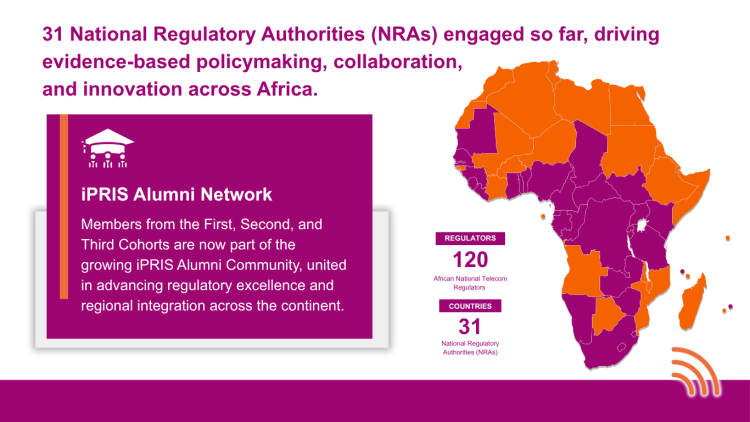
The incoming countries joining the seventh cohort will bring this number to 32 countries, reflecting the programme’s expanding footprint and its growing community of regulators committed to strengthening Africa’s digital future. Through its collaborative model, iPRIS has engaged more than 200 telecom experts from Africa and Europe, fostering continuous exchange between National Regulatory Authorities (NRAs), Regional Regulatory Organisations (RROs), and European partners. This growing network continues to strengthen institutional leadership, improve policy coherence, and bridge regional divides in digital governance. Each cohort contributes to a broader ecosystem of knowledge, where African regulators share best practices, pilot reforms, and build sustainable partnerships that collectively accelerate the continent’s digital transformation.
Below is a snapshot of some of the telecom experts and regulators that have been part of the journey so far
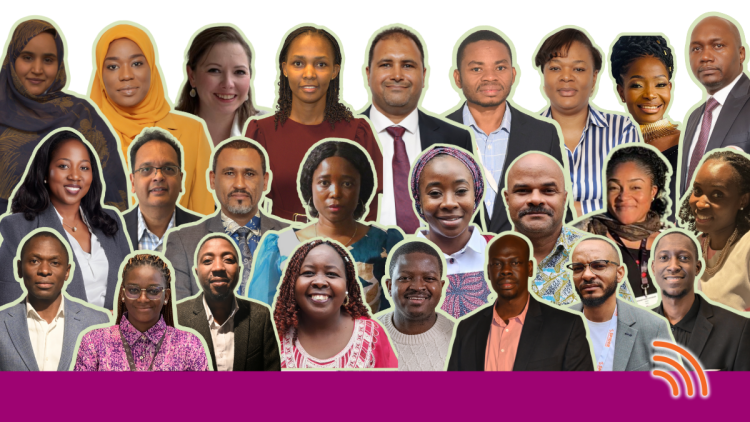
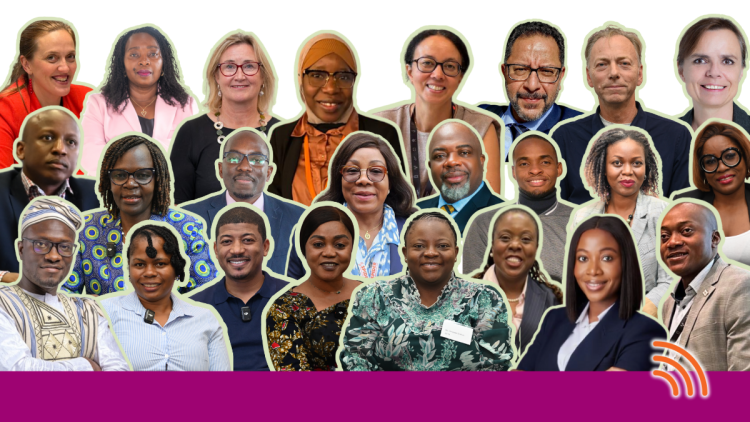
Progress within the region
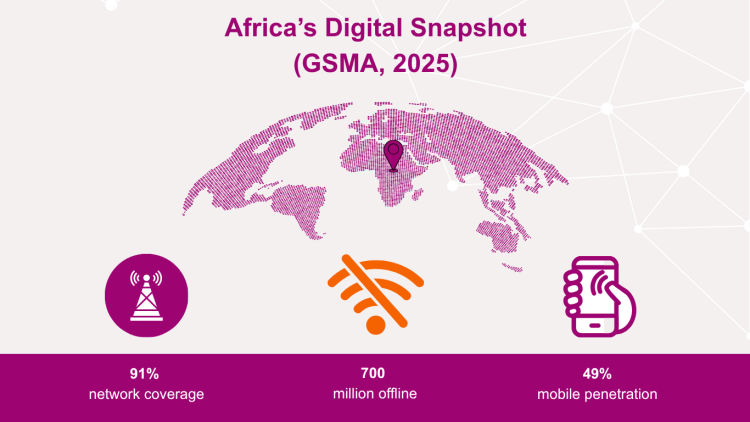
The impact is already visible. In Tanzania, regulators pioneered Direct-to-Mobile Satellite Guidelines, extending connectivity to remote areas. In Mozambique, a Change Initiative grew into a national roaming regulation that allows rural families to remain connected even when one network fails. In Mauritius, regulators are safeguarding the digital ecosystem with new Cybersecurity Guidelines, strengthening trust in online platforms, and preparing for a 5G-driven future. Uganda has stepped onto the global stage by hosting the ITU Global Symposium for Regulators (GSR 2024), bringing 900 delegates to Kampala and demonstrating Sub-Saharan Africa’s leadership in digital governance.
These milestones are the result of collaborative efforts across governments, regulators, development partners, and regional bodies. iPRIS is proud to have contributed as part of this wider community, driving digital transformation.
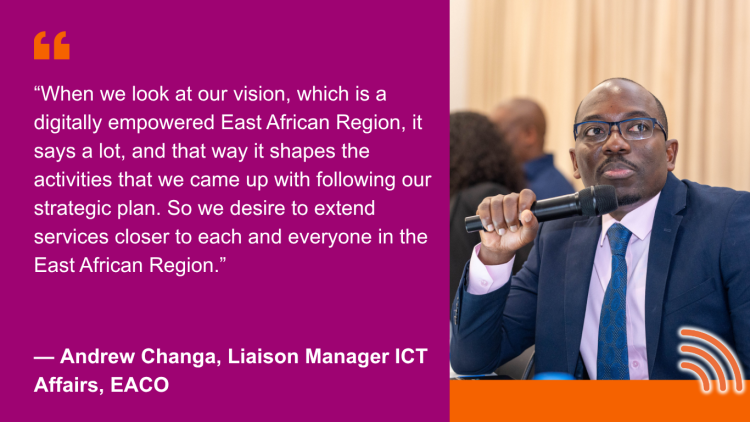
Implementation of the ECOWAS regional free roaming regulation
At WATRA, a number of initiatives are ongoing, most of which have yielded results towards providing meaningful connectivity in the sub-region, and some of these initiatives include;
- Supporting the Implementation of the ECOWAS Regional Free Roaming Regulation, which so far has provided affordable communication during migration within and across 9 West African nations with more progress to be made with the expected support from Workstream 2 of the iPRIS program;
- The advent of Non-Geostationary Orbit (NGSO) operations led to the development of an NGSO Framework at the regional (WATRA) level, which provides a guide to Regulators on how to successfully engage the NGSO operators and leverage their services to promote increased coverage and connectivity, especially in the underserved and unserved areas within the region.
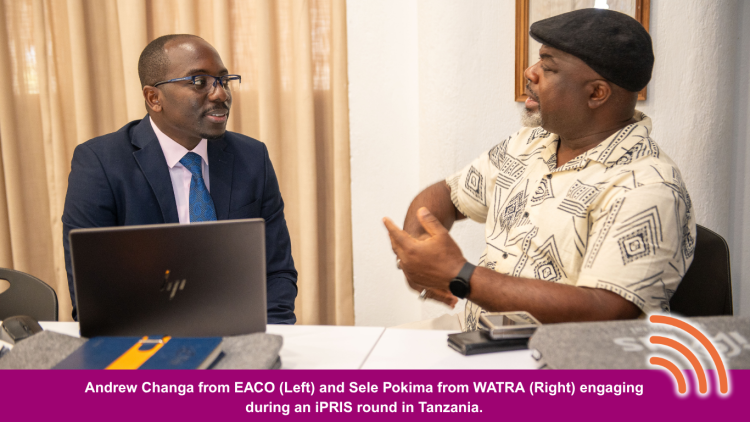
WATRA is also proud to play an active role in achieving the Digital Transformation Strategy (DTS) 2020 – 2030 for Africa, ensuring meaningful connectivity across all levels of the continent from the first to the last mile. Through the iPRIS project as well, various initiatives have been developed to promote connectivity across the sub-region, tackling critical areas of the telecommunications sector, including spectrum management and 5G deployment. With other key collaborations with the ITU, Smart Africa, and other development partners, WATRA is making strides towards ensuring meaningful connectivity across West Africa and Africa at large.
Access to 5G now reaches half the globe, but millions remain disconnected
According to the Sustainable Development Goals Report 2025 — marking the tenth annual stocktake of global progress toward the 2030 Agenda — the world stands at a critical juncture. With only five years left to achieve the SDGs, the report delivers a stark assessment: while millions of lives have improved, the pace of change remains insufficient to meet all 17 Goals by 2030. The report underscores that the Goals remain within reach only if action accelerates now. Across the world, young people, communities, civil society, and local leaders are driving efforts to deliver on the SDG promise. Connectivity is a key part of this global push. Although 5G coverage expanded to reach 51% of the world’s population by 2024, just five years after its commercial debut, progress remains deeply uneven. Eighty-four per cent of people in high-income countries have access to 5G, compared with only 4 per cent in low-income nations.
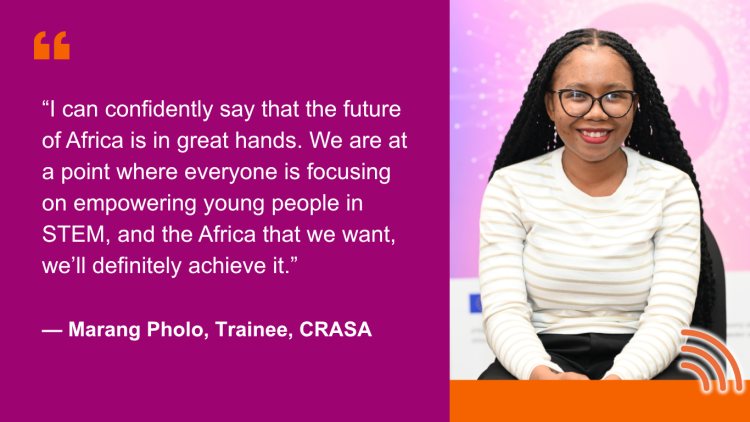
Watch the video below to learn more as Mugisha Bisanda, the Chief Technology Officer at Ericsson Tanzania, explores how operators can invest in fixed wireless access to expand 5G coverage to homes and businesses:
Where 5G is unavailable, 4G remains a vital alternative, covering 92% of the global population. Yet in low-income countries, 4G reaches just 52%, leaving 3G as the primary means of Internet access for many. Alarmingly, 4% of the world’s population remains entirely beyond mobile broadband coverage, with the largest gaps in Oceania (excluding Australia and New Zealand), where 24% have no access at all. The world’s Least Developed Countries (LDCs) and Landlocked Developing Countries (LLDCs) face similar challenges — 15% and 14% of their populations, respectively, lack mobile broadband access. These disparities highlight the urgent need for inclusive digital transformation and targeted investment to ensure that no one — or community — is left behind in the digital age.
Highlights: A three-week peer-learning journey
This incoming phase offers attending participants a comprehensive mix of expert-led sessions, collaborative project work, and field visits that connect theory with practical insights. The discussions will revolve around these components:
- Joint European Offer sessions conducted by PTS experts and telecom professionals from other partners on such matters as broadband rollout, spectrum allocation, secure communications, institutional and legal framework, future regulatory issues, competition control, and numbering and addressing. Digital inclusion discussions are among the other relevant sessions held.
- Project management, Beyond Universal Access, and MEAL (Monitoring, Evaluation, Accountability, and Learning) discussions conducted by SPIDER to enhance the implementation of Change Initiatives at the national level.
- Visits to PTS headquarters, Stockholm University, Ericsson, and Telia, where participants are shown models of innovation and governance that are pro-consumer and, at the same time, enable growth.
- A network dinner at the Vasa Museum has been planned to facilitate cooperation and cultural exchange.
Throughout the period, each NRA will continue to improve its Change Initiative, a national reform plan aimed at strengthening institutional performance and making the regulatory environment sustainable and inclusive.
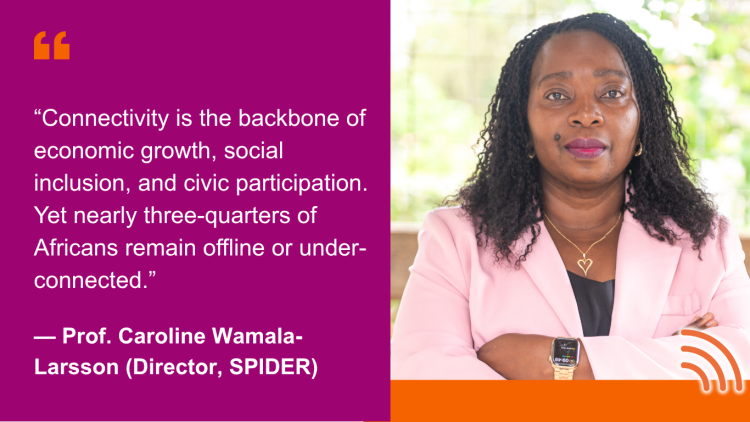
Read about the iPRIS sixth cohort sessions in Luxembourg here
Strengthening impact beyond knowledge exchange
As iPRIS turns two, its growing network of alumni and active cohorts reflects the programme’s sustained commitment to strengthening ICT regulation across Africa. To date, three cohorts have completed the iPRIS cycle, welcoming them into the alumni network, representing Anglophone and Francophone regions. The seventh cohort, meeting in Stockholm soon, continues this legacy of collaboration and peer learning. The number of Francophone cohorts that have participated in the iPRIS project are two, with more expected to join in the coming years. Claudio Bacigalupi, Head of Cooperation at European Union Delegation to Zambia and COMESA, highlighted the importance of collaboration in achieving regional harmonisation and creating a more conducive environment for innovation, investment, and cross-border digital services.
In 2026, iPRIS will expand its reach further through dedicated Portuguese-speaking rounds, designed to strengthen regional inclusion and linguistic diversity in digital policy dialogue. By the end of the project in 2028, iPRIS is expected to have trained over 300 African telecom regulators from 43 National Regulatory Authorities (NRAs) in designing and implementing evidence-based reforms for sustainable digital development.
Read about the first Francophone cohort here
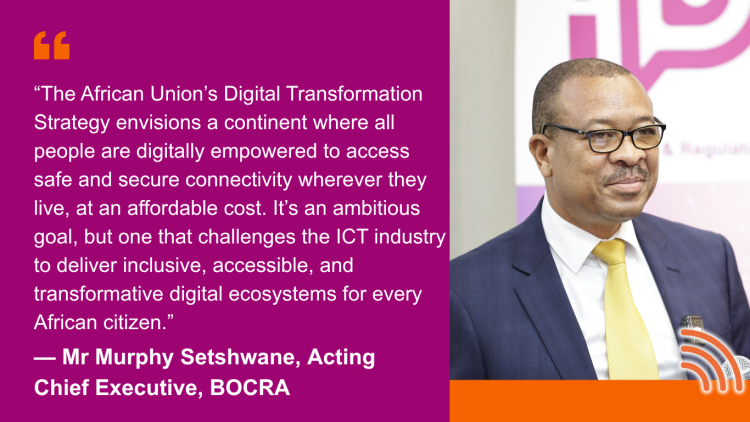
As this incoming cohort’s convening concludes in early December, participants will present their “Way Forward” project plans — strategic roadmaps for implementing regulatory reforms in their respective countries — supported by their RROs. This collaboration between African and European telecom experts continues to demonstrate how shared learning and partnership can strengthen institutional capacity, advance digital inclusion, and accelerate Africa’s transformation toward a connected, sustainable future.
Follow the journey of the seventh iPRIS cohort and their Change Initiatives on the iPRIS LinkedIn page as they translate global insights into national impact across Africa’s digital landscape.
iPRIS is coordinated and implemented by SPIDER in strategic and technical partnership with the Swedish Post and Telecom Authority (PTS) and Institut luxembourgeois de régulation (ILR), as well as ARTAC, CRASA, EACO, and WATRA.
iPRIS is funded by the European Union, Sweden, and Luxembourg as part of the Team Europe Initiative “D4D for Digital Economy and Society in Sub-Saharan Africa” (Code: 001).
